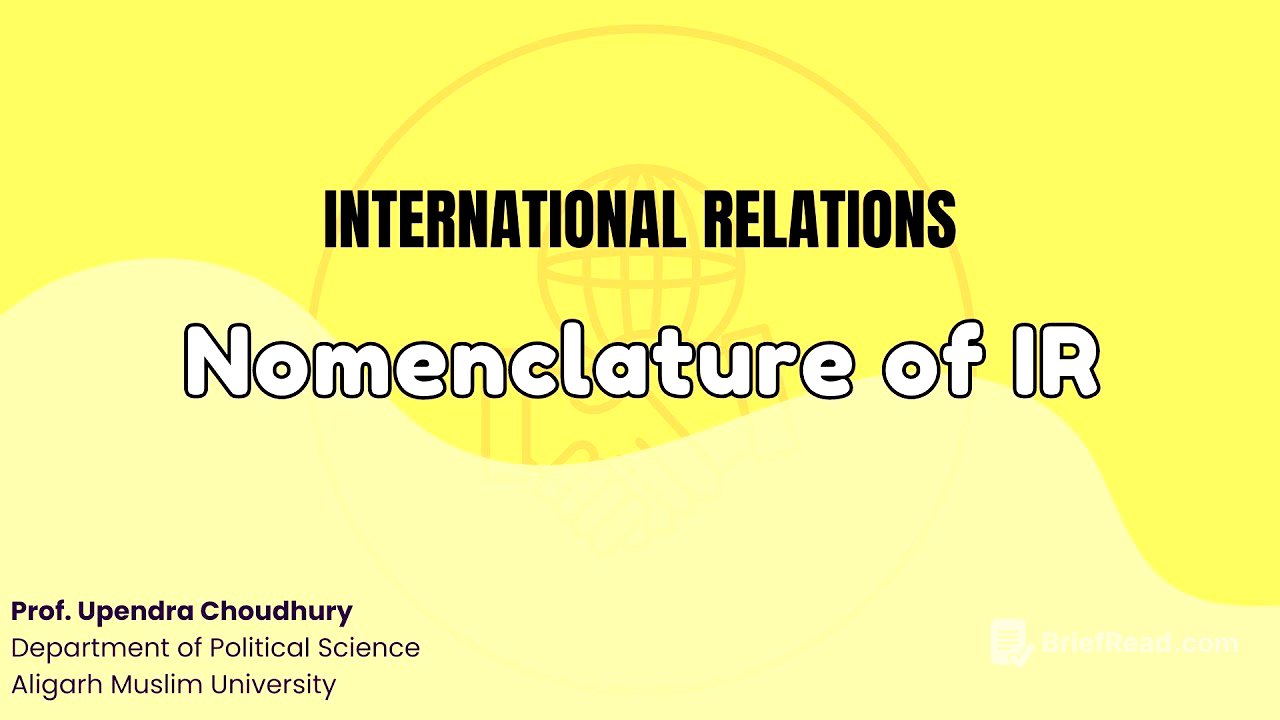TLDR;
This video explores the contested nomenclature of the discipline, focusing on why there are so many terms used, such as International Politics, International Relations, International Studies, and Global Politics. It differentiates between these terms, highlighting their evolution and the nuances in their application. The discussion concludes by advocating for the continued use of "International Relations" with a global perspective, acknowledging the importance of incorporating diverse, non-Western viewpoints and the role of ongoing debates in advancing knowledge.
- The discipline's nomenclature is highly contested, with terms like International Politics, International Relations, International Studies, and World Politics used.
- International Politics focuses on state-centric interactions, power dynamics, and conflict, while International Relations encompasses all forms of interactions among states, including political, economic, social, and cultural.
- International Studies broadens the scope to include societies, cultures, languages, and systems of government, emphasizing planetary and humanity issues.
- Global Politics addresses the limitations of a state-centric approach due to globalization, highlighting the influence of transnational corporations and non-governmental organizations.
- Despite the emergence of global perspectives, states remain central in providing security, articulating national voices, and facilitating global economic exchanges.
Introduction: Contested Nomenclature [0:15]
The discipline of international relations faces a contested nomenclature, with various terms used interchangeably despite their distinct meanings. Scholars use terms like "International Politics," "International Relations," "International Studies," and "World Politics," leading to potential confusion. While these terms share overlapping focuses, they differ significantly in scope and emphasis.
International Politics vs. International Relations [4:05]
"International Politics" was primarily used post-World War era, focusing on politics among sovereign nation-states, with power as a key element. Realists view international politics as a struggle for power within an anarchical state system, illustrated by the billiard ball model where states are independent entities prone to collision. This perspective emphasizes military and security matters, self-help, and survival, with diplomacy and balance of power as principal forms of state interaction. In contrast, "International Relations" encompasses all interactions among sovereign states, including political, economic, social, cultural, and scientific exchanges. While considering states as primary actors, it also acknowledges the roles of intergovernmental organizations, transnational corporations, and non-governmental organizations, highlighting the multi-disciplinary character of the discipline and cooperative aspects of state interaction.
International Studies: A Broader Perspective [14:09]
"International Studies" broadens the scope further, focusing on societies, cultures, languages, and systems of government, extending beyond state interactions to planetary and humanity issues. This approach emphasizes the big picture, considering the global context and broader implications of events, unlike the more state-centric focus of international relations.
Global Politics: Addressing Globalization [15:52]
The concept of "Global Politics" emerged with increased globalization and interdependence, challenging the state-centric approach. Scholars like Joseph Nye and Robert Keohane argue that transnational corporations and non-governmental organizations significantly influence international politics. Global politics encompasses a borderless and transplanetary approach, reflecting the diminished relevance of boundaries and sovereignty, and emphasizes global governance involving both state and non-state actors.
The Search for a Correct Nomenclature [19:32]
Despite discussions of a borderless world, states remain central in facilitating globalization, providing military security, articulating national voices, and driving global economic exchanges. The global and international are complementary, with the term "International" retaining importance due to the role of states.
Concluding Points: IR with a Global Perspective [22:22]
International Relations should incorporate a global perspective, integrating insights from the global perspective approach while recognizing the value of existing research and theories focused on nation-states. The discipline needs to give importance to non-Western forms of knowledge, including perspectives from the Global South, to become a truly global discipline. Contestation and debate are essential for advancing knowledge in social science disciplines. The video concludes by advocating for the continued use of the term "International Relations" with an integrated global perspective.









